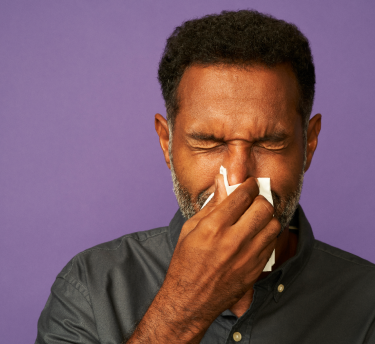Dust allergies are especially common in people who have a sensitivity to house dust mites. These tiny creatures live in many homes and can cause skin irritation and an allergic response in people with sensitive skin.


How to Tell The Difference Between Allergies and a Cold
Can’t figure out whether you have allergies or a cold? To get the relief you need, you'll need to figure out which one you have first.
Colds are infections of the upper respiratory tract (sinuses, nose and throat).1 Colds are caused by several different viruses and are spread through the air or via close personal contact with someone else who has a cold.2 Seasonal allergies (hay fever) is caused by the immune system reacting to pollen from trees, grasses, and weeds as if it were harmful to the body.3 Symptoms of allergies can include sneezing, runny nose, congestion, itchy eyes and throat, and post-nasal drip.
Cold vs allergies
By understanding the differences between allergies and colds, you can quickly identify the correct means of relief. To help you determine whether you have allergies or a cold, you can track your symptoms over time to help identify patterns that indicate allergies or a cold. Pay attention to the timing of your symptoms, such as if they appear after being exposed to certain environments (such as pollen) or if they come and go in a cycle.4 You can also look for other signs of allergies, such as itchy eyes, sneezing, or a runny nose.5 Colds are typically accompanied by more other symptoms such as fever, sore throat, and body aches.
How to tell the difference?
Pay attention to the timing of your symptoms.
Allergies are usually worse during certain times of the year when pollen counts are high.5 Paying attention to the timing of your symptoms can help you to better recognize when you might be affected by either a cold, or allergies and seek the right treatment more quickly. Knowing when allergies or colds are most likely to strike can also give you the chance to plan ahead and be prepared.
Location can be a clue.
Along with certain times of the year, allergies may be worse in certain areas where pollen counts are higher too,3 while colds can be spread more easily in enclosed spaces like schools and offices.2 While location can be a good clue, it’s important to consider other factors to help determine whether you’re dealing with a cold vs. allergies.
Look at the type of symptoms you have.
Colds often cause a sore throat, fever, and body aches while allergies typically cause sneezing, itchy eyes and throat, and nasal congestion.5 You can find out more about the different symptoms to expect with colds and allergies, and how to tell the difference between the two below.
What symptoms to expect from cold vs. allergies
It can be hard to distinguish between a cold and allergies because they share many common symptoms, including sneezing, coughing, sore throat and runny nose, as well as nasal congestion and watery eyes. Because of this, it can be easier to differentiate between a cold or allergies by looking at what symptoms you don't have, rather than the ones you do.
Colds typically cause a fever, body aches, fatigue and a decrease in appetite, while allergies typically don't.6 Allergies often cause itchy eyes and throat.
Treatment for Cold and Allergies
Treating the common cold
In most cases, you can treat the symptoms of a mild cold yourself. Most people will get better by themselves within 7 to10 days without any treatment. Some things you can do to relieve cold symptoms include:7
Treating allergies
Treatment for allergies depends on the type and severity. Talk to your doctor about what treatments may suit you. Your doctor may refer you to an allergy specialist for further assessment and treatment.
Allergies can be treated with antihistamine medicines. These may be given as a tablet, nasal spray or eye drops. Corticosteroid medicines are sometimes used to treat allergies. Depending on your symptoms, these may be given as a nasal spray, inhaler or skin ointment.8
Find out more about which medicine may help to alleviate your allergy symptoms.
To find out more about common over‐the‐counter hayfever allergy treatments available, visit your local pharmacy.
Related articles